VW ID.3 vs Nissan Micra - Differences and prices compared
Compare performance (326 HP vs 150 HP), boot space and price (28600 £ vs 24000 £ ) at a glance. Find out which car is the better choice for you – VW ID.3 or Nissan Micra?
Costs and Efficiency:
Price and efficiency are often the first things buyers look at. Here it becomes clear which model has the long-term edge – whether at the pump, the plug, or in purchase price.
Nissan Micra has a slightly advantage in terms of price – it starts at 24000 £ , while the VW ID.3 costs 28600 £ . That’s a price difference of around 4577 £.
In terms of energy consumption, the advantage goes to the Nissan Micra: with 14.20 kWh per 100 km, it’s barely noticeable more efficient than the VW ID.3 with 14.50 kWh. That’s a difference of about 0.30 kWh.
As for electric range, the VW ID.3 performs evident better – achieving up to 605 km, about 189 km more than the Nissan Micra.
Engine and Performance:
Under the bonnet, it becomes clear which model is tuned for sportiness and which one takes the lead when you hit the accelerator.
When it comes to engine power, the VW ID.3 has a significantly edge – offering 326 HP compared to 150 HP. That’s roughly 176 HP more horsepower.
In acceleration from 0 to 100 km/h, the VW ID.3 is decisively quicker – completing the sprint in 5.70 s, while the Nissan Micra takes 8 s. That’s about 2.30 s faster.
In terms of top speed, the VW ID.3 performs distinct better – reaching 200 km/h, while the Nissan Micra tops out at 150 km/h. The difference is around 50 km/h.
There’s also a difference in torque: VW ID.3 pulls clearly stronger with 545 Nm compared to 245 Nm. That’s about 300 Nm difference.
Space and Everyday Use:
Whether family car or daily driver – which one offers more room, flexibility and comfort?
Both vehicles offer seating for 5 people.
In curb weight, Nissan Micra is noticeable lighter – 1452 kg compared to 1787 kg. The difference is around 335 kg.
In terms of boot space, the VW ID.3 offers a bit more room – 385 L compared to 326 L. That’s a difference of about 59 L.
In maximum load capacity, the VW ID.3 performs to a small extent better – up to 1267 L, which is about 161 L more than the Nissan Micra.
When it comes to payload, VW ID.3 a bit takes the win – 473 kg compared to 408 kg. That’s a difference of about 65 kg.
Who wins the race?
The VW ID.3 proves to be dominates this comparison and therefore becomes our DriveDuel Champion!
VW ID.3 is the better all-rounder in this comparison.

VW ID.3
Costs and Consumption
View detailed analysis
Engine and Performance
View detailed analysis
Dimensions and Body
View detailed analysis
VW ID.3
The VW ID.3 is a crisply styled electric hatch that masks serious practicality behind a friendly, modern face, making city runs and longer trips pleasantly fuss free. For buyers seeking a sensible, well-equipped EV that doesn't take itself too seriously, the ID.3 strikes a neat balance of comfort, tech and everyday usability with a cheeky smile.
details
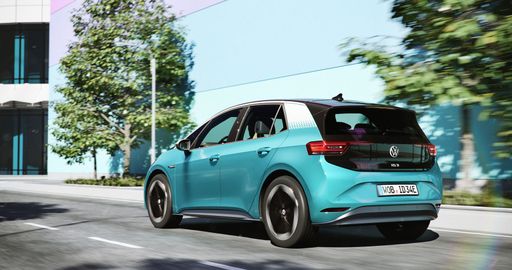
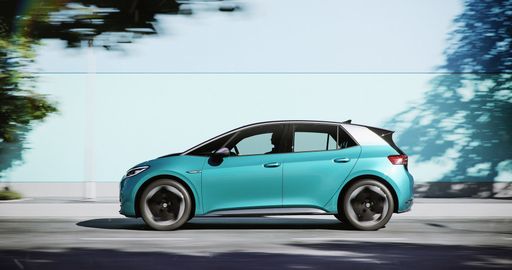
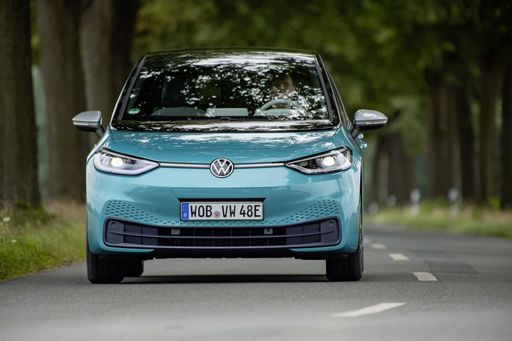
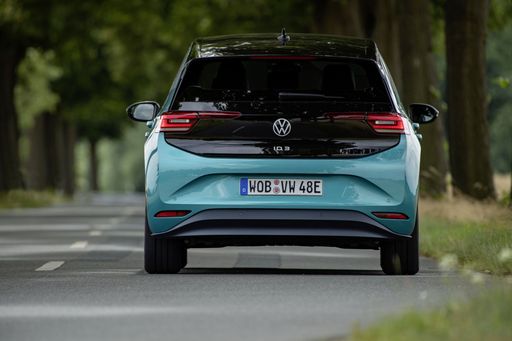
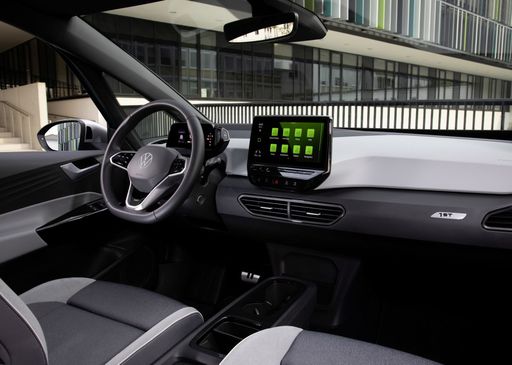

Nissan Micra
The Nissan Micra is a compact hatchback renowned for its agile handling and city-friendly dimensions. With a design that blends sleek curves with a practical layout, it appeals to urban drivers who value style and efficiency. Inside, the car offers a surprising amount of room and useful tech features, making it both a convenient and comfortable ride for daily commutes.
detailsCosts and Consumption |
|
|---|---|
|
Price
28600 - 49300 £
|
Price
24000 - 29900 £
|
|
Consumption L/100km
-
|
Consumption L/100km
-
|
|
Consumption kWh/100km
14.5 - 15.8 kWh
|
Consumption kWh/100km
14.2 - 14.7 kWh
|
|
Electric Range
383 - 605 km
|
Electric Range
317 - 416 km
|
|
Battery Capacity
52 - 79 kWh
|
Battery Capacity
40 - 52 kWh
|
|
co2
0 g/km
|
co2
0 g/km
|
|
Fuel tank capacity
-
|
Fuel tank capacity
-
|
Dimensions and Body |
|
|---|---|
|
Body Type
Hatchback
|
Body Type
Hatchback
|
|
Seats
5
|
Seats
5
|
|
Doors
5
|
Doors
5
|
|
Curb weight
1787 - 1993 kg
|
Curb weight
1452 - 1527 kg
|
|
Trunk capacity
385 L
|
Trunk capacity
326 L
|
|
Length
4264 mm
|
Length
3974 mm
|
|
Width
1809 mm
|
Width
1774 mm
|
|
Height
1564 mm
|
Height
1490 mm
|
|
Max trunk capacity
1267 L
|
Max trunk capacity
1106 L
|
|
Payload
437 - 473 kg
|
Payload
403 - 408 kg
|
Engine and Performance |
|
|---|---|
|
Engine Type
Electric
|
Engine Type
Electric
|
|
Transmission
Automatic
|
Transmission
Automatic
|
|
Transmission Detail
Reduction Gearbox
|
Transmission Detail
Reduction Gearbox
|
|
Drive Type
Rear-Wheel Drive
|
Drive Type
Front-Wheel Drive
|
|
Power HP
170 - 326 HP
|
Power HP
122 - 150 HP
|
|
Acceleration 0-100km/h
5.7 - 8.2 s
|
Acceleration 0-100km/h
8 - 9 s
|
|
Max Speed
160 - 200 km/h
|
Max Speed
150 km/h
|
|
Torque
310 - 545 Nm
|
Torque
225 - 245 Nm
|
|
Number of Cylinders
-
|
Number of Cylinders
-
|
|
Power kW
125 - 240 kW
|
Power kW
90 - 110 kW
|
|
Engine capacity
-
|
Engine capacity
-
|
General |
|
|---|---|
|
Model Year
2024 - 2025
|
Model Year
2026
|
|
CO2 Efficiency Class
A
|
CO2 Efficiency Class
A
|
|
Brand
VW
|
Brand
Nissan
|
Is the VW ID.3 offered with different drivetrains?
Available configurations include Rear-Wheel Drive.




